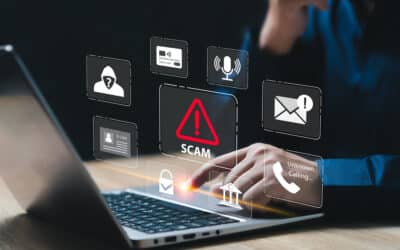In 2023, consumers reported $752 million dollars lost because of online retail scams. With the rise in internet shopping fraud, we’ve put together a list of what to look for before buying something from an online store, how to protect yourself when purchasing online and what to do if you become a victim of this type of fraud.
What Should I Look for When Making Purchases from an Online Business?
When you receive a fraudulent email, it’ll likely include a new invoice, a new contact person for customer service issues and new instructions on how to complete the purchase. Here are a few more red flags to spot internet shopping scams via email.
- The price for the purchase that was previously agreed upon has increased.
- The method of payment has changed from cashier’s check or a wire transfer to gift cards and/or cryptocurrency.
- If the payment was supposed to be sent via wire, the information (name or address of the business or receiving bank details) for the wire has changed.
- The phone number to reach the business has changed—This new contact is trying to represent themselves as an employee of the online store but is actually a fraudster.
- Discussions and interactions with the business are starting to become more difficult.
- Emails become less friendly and professional and are more demanding with a higher sense of urgency for you to remit your funds for the purchase.
What Steps Can I Take to Protect Myself from Fraudulent Online Purchases?
These are seven easy ways you can prevent online shopping scams, keep your personal information secure and stay safe while shopping online.
- Confirm the business you’re working with has been verified by the Better Business Bureau and is in good standing before checking out.
- Review the invoice and make sure the amount is what was agreed upon and the business information on the invoice is correct (business name, address, phone number and email address).
- Inspect the email address. Is it the same as when the interaction started? For example, has the email address changed from .org to .com?
- Look for misspelled words and grammatical errors.
- Be wary of changes to wire instructions. For example, is the wire now going to a person instead of a business? Is it going to a different address?
- Request a tracking number if you are buying a product sent via USPS, FedEx, etc.
- Always ask questions and make sure the transaction and communication align with the brand, especially when it comes to purchases online or finalizing the purchase through digital methods.
What Should I Do If I Become a Victim of Online Store Scams?
Follow these steps if you suspect you’ve encountered an online retail scam.
- Report the fraud to the FTC.
- File a complaint with the Better Business Bureau.
- If there was any financial loss to you, report the crime to your local police department.
- If there was any financial loss to you because the scammer had you purchase gift cards, call the number on the back of the gift card and report that the cards were bought in a scam.
- If a wire was sent, you can ask your financial institution if they can recall the wire because of a scam.
- If personal information was given out at any time, ensure you are monitoring your credit. You can check your credit report from the three major credit bureaus free of charge once a year.
- Block your social security number by contacting the Social Security Administration (1-800-772-1213) or put a security freeze on your credit report.
- Explore more resources on the Centris Cybersecurity Center.
As technology makes things easier and more convenient for people to buy anything online, if not done carefully, it may create opportunities for scammers to exploit everyone involved in the transaction. Always use caution before sending funds, do extra research and talk with your financial institution if you have questions before doing business with a suspicious online store.





